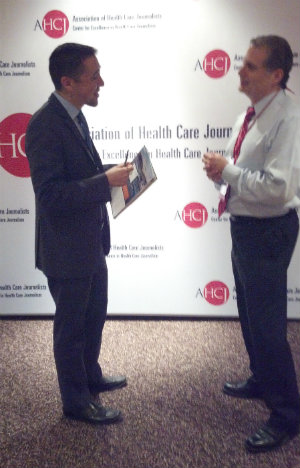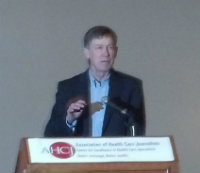 Marcus Escobedo, left, talks with AHCJ Executive Director Len Bruzzese at this year's conference in Denver.
Marcus Escobedo, left, talks with AHCJ Executive Director Len Bruzzese at this year's conference in Denver.Growing up, my parents would get up every morning, pour their coffee, and read the nearest “big city” newspaper, the Corpus Christi Caller-Times. In the evening, they’d watch the local TV news, followed by Dan Rather or one of the other network anchors.
The way I get my news today is a bit different, to say the least. I’m reading The New York Times on my phone, browsing through blogs, and paying attention to RSS feeds throughout the day. What hasn’t changed is our need for quality journalism that we can trust to inform and educate us about what’s going on in the world.
Fortunately, when it comes to covering the rapid and complex changes in health care, there is a diverse cadre of reporters, represented by the Association of Health Care Journalists (AHCJ), that is working hard to bring us accurate, relevant news coverage in all the forms and outlets that now exist. About 700 of these association members attended the group’s annual conference in Denver last week. I’d like to think that thanks to the John A. Hartford Foundation’s support and the presentations by several of our grantees, these journalists are even better prepared to cover the area of health care to which we have been dedicated for the past three decades—older adults.
And it was valuable to hear from the attendees what topics they’re most interested in—including such important issues for us as depression, dementia, the Affordable Care Act, Medicare/Medicaid innovations, and aging in place, among numerous others.
 Aging issues were prominently featured in the skill and knowledge-building sessions for these journalists and three of our Beeson Scholars presented on different topics. Jean Kutner, MD, a geriatrician and palliative medicine physician, spoke on a panel about the clinical and ethical issues involved in helping patients at the end of life and about procedures that should be questioned because of their potential harm, such as the use of feeding tubes in advanced dementia patients.
Aging issues were prominently featured in the skill and knowledge-building sessions for these journalists and three of our Beeson Scholars presented on different topics. Jean Kutner, MD, a geriatrician and palliative medicine physician, spoke on a panel about the clinical and ethical issues involved in helping patients at the end of life and about procedures that should be questioned because of their potential harm, such as the use of feeding tubes in advanced dementia patients.
In another session, Dr. David Cassaret, also an expert in hospice and palliative medicine, pleaded with journalists to not only focus on cost—certainly a major driver of reader interest in health care—but to also report on quality outcomes when looking at new federally funded models, such as the ones he is testing to expand hospice services.
Emmy Betz, a newer Beeson Scholar from the Emergency Medicine field, discussed her insights into the epidemiology of suicide, a terrible problem in the frontier states. While her research in this area extends beyond the elderly population, she made a forceful case about how depression and thoughts of dying are not a normal part of aging. On another day, Dr. Jules Rosen, a former co-director of our Center of Excellence in Geriatric Psychiatry at the University of Pittsburgh (he’s now in practice in Colorado), talked about how important depression care is, especially considering that 6 million older adults suffer from this treatable condition that too often leads to these tragic suicides.
Other sessions on Medicare policy, patient safety, electronic health records, and hospital ratings also, of course, touched on the older adult population. The AHCJ does a great job compiling what attendees write from the conference, and you can visit their story page to see the wide range of topics covered.
The organization also holds an annual Awards for Excellence in Health Care Journalism contest, and I was pleased to note that the newspaper my parents read every morning, the Corpus Christi Caller-Times, took second prize in the Public Health (Small Media) category for a series on the cost of diabetes.
 Colorado Gov. John Hickenlooper address the AHCJ conference.
Colorado Gov. John Hickenlooper address the AHCJ conference.Gov. John Hickenlooper, who welcomed the conference attendees, didn’t specifically note the health needs of older adults in his state, but he did discuss health care reform (of course, not until he had addressed a topic of “high” interest to reporters—the state’s recent legalization of recreational as well as medical marijuana) and he specifically noted the potential of the patient-centered medical home model.
We are particularly interested in the medical home model of enhanced primary care and how it can meet the needs of the geriatric population. As an exhibitor at the conference, I spent a lot of time telling journalists about our own work in primary care, and our belief that we need to listen directly to older adults if we are going to be successful at delivery system reinvention.
To that end, we will be releasing a public opinion poll this week in which we asked older adults themselves about their perceptions of team care and the other enhanced services of the medical home model. We think we’ve got an important message to share. (If you’re wondering what that message is, check back on Health AGEnda Thursday, when we’ll release the results. But if you’re a reporter interested in covering the story, please contact us for more information).
We are proud to have sponsored the Association of Health Care Journalists, not only with their conference, but also by supporting their Aging Core Topic web page, which is a resource for journalists. This is part of our attempt in the Policy and Communications portfolio to influence policy makers and other decision makers with the kind of high-quality information and evidence that AHCJ members are working so hard to provide.
